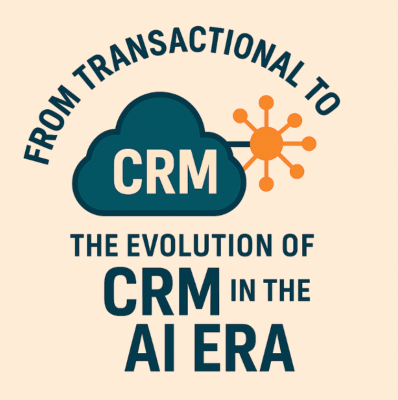
Customer Relationship Management (CRM) has long been associated with transactional functions—tracking sales, managing customer interactions, and streamlining processes. However, with the advent of artificial intelligence (AI), CRM has undergone a fundamental shift from being merely a record-keeping tool to a transformative force that enhances customer engagement, drives innovation, and reshapes business strategies. Here’s how CRM is evolving in the AI era.
1. From Data Collection to Intelligent Insights
Traditional CRM systems primarily focused on gathering and storing customer data. However, AI-powered CRM tools go beyond this by analyzing vast amounts of data to generate predictive insights. Machine learning algorithms can identify patterns in customer behavior, anticipate needs, and provide recommendations, allowing businesses to proactively address issues and optimize customer experiences.
2. Hyper-Personalization Through AI
AI enables CRM to move beyond generic personalization to hyper-personalization. By analyzing browsing history, purchase patterns, and sentiment analysis, AI-driven CRMs can tailor recommendations, automate responses, and customize marketing messages in real time. This level of personalization enhances engagement, builds stronger customer relationships, and increases conversion rates.
3. Automation and Efficiency
AI-powered CRM systems automate repetitive tasks, freeing up human agents to focus on high-value interactions. Chatbots, virtual assistants, and automated workflows handle customer inquiries, schedule follow-ups, and streamline processes. This automation not only improves efficiency but also ensures a consistent and seamless customer experience.
4. Predictive Analytics for Business Growth
AI-driven CRM systems are not just reactive but also predictive. By analyzing past interactions, AI can forecast sales trends, identify potential churn risks, and suggest optimal engagement strategies. Businesses can leverage these insights to refine their marketing efforts, enhance customer retention, and drive revenue growth.
5. Seamless Omnichannel Integration
Customers interact with brands across multiple touchpoints—social media, email, websites, and in-store visits. AI-powered CRM systems integrate these channels seamlessly, ensuring a unified and cohesive customer experience. Whether a customer contacts support via chat or makes a purchase in-store, the CRM system consolidates interactions to provide a holistic view of their journey.
6. Ethical AI and Data Responsibility
With great power comes great responsibility. As CRM systems leverage AI for data-driven decision-making, businesses must prioritize ethical AI practices. Transparency in data usage, compliance with privacy regulations, and ensuring that AI-driven decisions do not introduce bias are crucial to maintaining customer trust and brand reputation.
Conclusion
The evolution of CRM in the AI era marks a shift from transactional efficiency to transformational engagement. AI-powered CRM systems are not only streamlining processes but also redefining customer relationships through intelligent insights, hyper-personalization, automation, predictive analytics, and omnichannel integration. As businesses continue to harness AI’s potential, CRM will remain at the heart of innovation, driving customer loyalty and business growth in a rapidly evolving digital landscape.